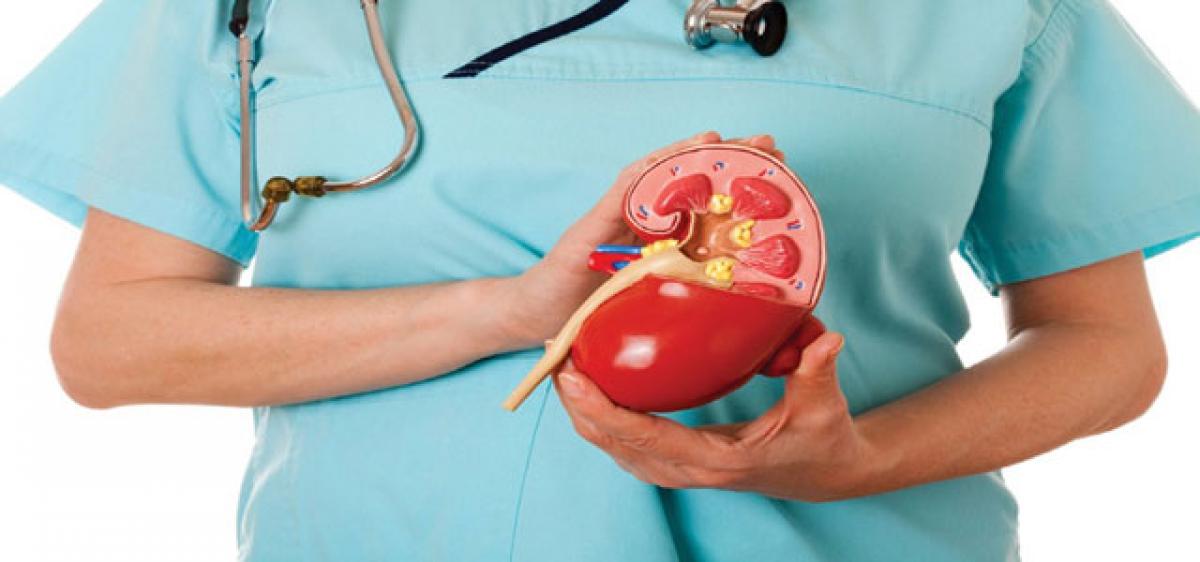Live
- Don’t buy assets from known ganja smugglers: DIG
- Youth Cong takes out ‘mashaal rally’ condemning Amit Shah’s statement on Ambedkar
- Hyderabad remained peaceful in 2024,but sees sharp spike in cybercrimes
- MP, West MLA distribute cheques to critical patients
- Hyderabad Book Fair a big draw among book lovers
- GVMC secures 1st place in best public awareness programme category
- 39 transgenders recruited as Traffic Assistants
- Jesus’ teachings promote unity, compassion: Haryana Governor
- Special drive held on road safety
- Simultaneous elections not imminent: Purandeswari
Just In

The kidneys play an important role in the body: they filter the blood, removing waste products and excess salt and water. If the kidneys become diseased, they fail in their task, leaving the blood polluted.
The kidneys play an important role in the body: they filter the blood, removing waste products and excess salt and water. If the kidneys become diseased, they fail in their task, leaving the blood polluted. Finding out that you have early kidney disease can alert you that your kidneys are in danger. It is important to take steps to protect your kidneys before the problem advances.
What are the symptoms of Kidney Disease?
People who develop kidney disease usually have no symptoms early on, although the condition puts them at risk of developing more serious kidney disease. Symptoms like swelling of lower limbs, face swelling, difficulty in breathing, loss of appetite, nausea, vomiting, decrease in hemoglobin level and bone disease develop at very late stages of kidney disease.
How to diagnose Kidney Disease?
Urine tests for protein called albumin are recommended once per year in people with diabetes and hypertension, staring at the time of diagnosis. If there is albumin more than 30mg/day in urine or urine albumin creatinine ratio more than 30mg/g of creatinine, it means you may have kidney disease. Blood chemistry abnormalities like rise in creatinine and blood urea develop at late stages of kidney disease.
What are the risk factors for Kidney Disease?
- Having elevated blood sugar levels
- Hypertension
- Being overweight or obese
- Smoking
- Having a diabetes – related
vision problem (Diabetic retinopathy) or nerve damage (Diabetic neuropathy)
- Having a family history of kidney disease
Prevention and treatment of Kidney Disease
Consult kidney specialist (Nephrologist) before starting treatment
- Limit the amount of salt you eat
- If you smoke, quit smoking
- Lose weight if you are overweight
- Keeping blood sugars close to normal (Target blood glucose levels before each meal 80 to 120mg/dl and HbA1C of 7percent of less)
- Manage high blood pressure (blood pressure reading below 130/80 is recommended)
- Use Angiotensin converting enzyme inhibitor (abbreviated ACE inhibitor) or a related drug known as an angiotensin receptor blocker (ARB) to control blood pressure and proteinuria.
- Avoid pain killers (like Ibuprofen, Diclofenac, and Nimesulide – NSAIDS).
- Inform your family doctor that you are having kidney disease.
- Diet as per your doctor’s advice.
Kidney Disease complications
The key complication of kidney disease is more advanced kidney disease, called chronic kidney disease. Chronic kidney disease can, in turn, progress even further, eventually leading to total kidney failure and the need for dialysis (Hemodialysis or peritoneal dialysis) or kidney transplantation.
The Writer is Dr Dilip M Babu M.D., D.M. (Nephrology) Consultant Nephrologist and Transplant Physician, Apollo Hospitals.

© 2024 Hyderabad Media House Limited/The Hans India. All rights reserved. Powered by hocalwire.com







